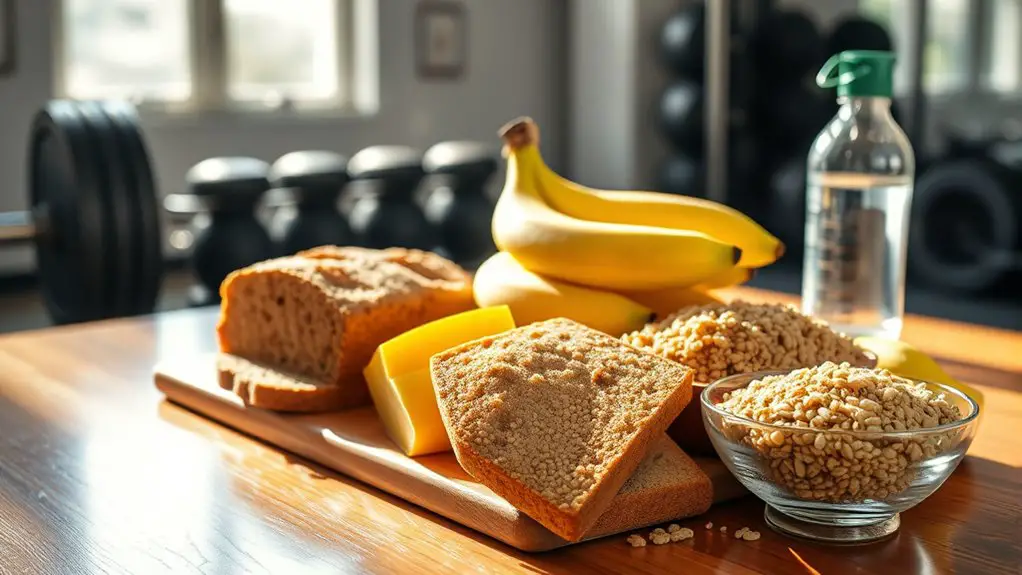The Role of Carbs in Gym Performance

Carbohydrates play a crucial role in your gym performance by serving as the primary fuel source for energy during workouts. They power your muscles through glycogen, which fuels high-intensity exercises. When you time your carb intake strategically—before and after workouts—you can optimize energy levels and enhance recovery. Balancing carbs with proteins and fats is essential for overall performance. Discovering the best carb sources and their impact can further improve your training routine.
Understanding Carbohydrates and Their Function

When you think about fueling your workouts, understanding carbohydrates and their function is essential. Carbs play a significant role in your body’s energy production, particularly during high-intensity exercises. When you consume carbohydrates, your body breaks them down through a process called carb metabolism, converting them into glucose. This glucose is then used as a primary energy source for your muscles, helping you power through your workouts effectively.
It’s important to choose the right types of carbohydrates, focusing on whole grains, fruits, and vegetables. These options offer not just energy but also crucial nutrients that support overall health and safety during your workouts. By ensuring you have adequate carbohydrate intake, you can maintain your stamina and optimize performance while minimizing the risk of fatigue or injury. Remember, balancing your carb consumption with proteins and fats is key to achieving your fitness goals safely and effectively.
The Importance of Glycogen Stores
Glycogen stores are essential for maximizing your gym performance, especially during prolonged or intense workouts. When you push your limits, your body relies heavily on glycogen. If you experience glycogen depletion, your energy levels can plummet, leading to fatigue and decreased endurance performance. That’s why it’s vital to maintain adequate glycogen levels before and after your workouts.
To support muscle recovery, consider implementing effective recovery strategies. Consuming carbohydrates post-exercise helps replenish glycogen stores, ensuring you’re ready for your next session. Pairing carbs with protein can enhance muscle recovery, allowing your body to repair itself more efficiently.
Incorporating a balanced diet rich in carbohydrates can prevent glycogen depletion and enhance your overall performance. By prioritizing your glycogen stores, you’re not just improving your workouts but also promoting safer and more effective training sessions. Remember, taking care of your body today will pay off in your future fitness endeavors.
Carbs as Fuel: How They Power Your Workouts

Carbohydrates serve as the primary fuel source for your workouts, powering everything from high-intensity interval training to endurance sessions. When you consume carbs, your body breaks them down into glucose, which is stored as glycogen in your muscles and liver. This glycogen becomes essential during exercise, providing the energy you need for peak performance.
To maximize workout efficiency, many athletes turn to carb cycling. This strategy involves alternating between high- and low-carb days, helping your body adapt to different energy demands. By fine-tuning your carb intake, you can enhance your energy levels while promoting fat loss, making your workouts more effective.
Timing Your Carb Intake for Maximum Benefit
To reap the full benefits of your workouts, it is crucial to time your carb intake strategically. Eating the right carbs at the right times can optimize your performance and recovery. Here’s a quick guide:
| Timing | Suggestions |
|---|---|
| 30-60 minutes pre | Whole grain toast, banana |
| During workout | Sports drink, energy gels |
| 30 minutes post | Greek yogurt, fruit |
| 1-2 hours post | Quinoa salad, chicken |
| Throughout the day | Oats, brown rice |
Before your workout, focus on pre workout snacks rich in carbs to fuel your energy. After exercising, prioritize carbs for post workout recovery; this helps replenish glycogen stores and aids muscle repair. By timing your intake, you’re setting yourself up for safer, more effective workouts.
Different Types of Carbohydrates: Simple vs. Complex

Understanding the different types of carbohydrates can help you make better choices for your workout nutrition. Carbohydrates are primarily categorized into simple and complex types. Simple carbohydrates, found in foods like fruits and sugars, are quick sources of energy. They can provide a rapid boost, which might be beneficial for short, intense workouts. However, consuming too many simple carbs can lead to energy crashes.
On the other hand, complex carbohydrates, found in whole grains, legumes, and vegetables, digest more slowly, offering sustained energy over time. This gradual release can be especially helpful during longer workouts or endurance activities.
When planning your meals, consider including a balance of both types. Simple carbs can fuel your immediate needs, while complex carbs support your overall energy levels throughout your training sessions. Making informed choices guarantees you’ll feel good and perform safely during your workouts.
Best Carbohydrate Sources for Athletes
When you’re fueling your body for ideal athletic performance, choosing the right carbohydrate sources is essential. Whole grain options like brown rice, quinoa, and whole grain pasta provide sustained energy, while fruit varieties such as bananas and berries offer quick, natural sugars. Don’t overlook starchy vegetables like sweet potatoes or corn, which are great for pre-workout meals. Legume benefits are also significant; beans and lentils are high in fiber and protein, making them excellent choices. For on-the-go energy, consider sports drinks and energy gels, but opt for those with minimal additives. Snack ideas like rice cakes with nut butter or yogurt with fruit can keep your energy levels stable. Remember, the right rice choices and pasta types can make a big difference in your meal prep, ensuring you’re well-fueled for every workout. Prioritize these sources to enhance your performance safely and effectively.
Balancing Carbs With Protein and Fats
To maximize your gym performance, it’s key to find the right balance between carbs, protein, and fats. The ratios of these macronutrients can greatly impact your energy levels and recovery. Plus, timing your nutrient intake can make all the difference in how you feel during and after your workouts.
Macronutrient Ratios Matter
Balancing carbs with protein and fats is essential for optimizing your gym performance. Achieving the right macronutrient balance can enhance your energy levels, support muscle recovery, and promote overall health. Here are three key points to reflect on:
- Energy Source: Carbs provide quick energy, while protein and fats are important for sustained energy and recovery.
- Muscle Repair: Adequate protein intake helps repair and build muscle tissue, significant after intense workouts.
- Hormonal Balance: Healthy fats are essential for hormone production, which can influence your performance and recovery.
Timing Your Nutrient Intake
While the right balance of carbohydrates, protein, and fats is essential for gym performance, timing your nutrient intake can greatly enhance your results. Start your workout routine by fueling up with pre workout snacks that focus on carbs and a bit of protein. This’ll give you the energy you need to power through your session. After exercising, prioritize post workout recovery with a meal rich in protein and healthy fats, along with some carbs to replenish your glycogen stores. This combination aids muscle repair and helps you recover safely. Remember, it’s not just what you eat, but when you eat it that matters. By timing your nutrients effectively, you’ll maximize your performance and support your overall health.
The Impact of Low-Carb Diets on Performance
Although many athletes turn to low-carb diets for weight loss and improved health, the impact on performance can be significant. While you might see some initial benefits, here are a few low carb effects you should consider:
- Performance Decline: Reduced carbohydrate intake can lead to energy deficits, making it harder to maintain training intensity and resulting in strength limitations during workouts.
- Endurance Issues: Low-carb diets may cause endurance issues, as your body struggles to fuel prolonged exercise, leading to quicker fatigue and reduced overall performance.
- Recovery Challenges: After intense training, you might experience recovery challenges, including increased mental fatigue and muscle loss, due to inadequate glycogen replenishment and metabolic adaptations.
Ultimately, while low-carb diets might work for some, they can lead to significant performance declines that affect your training and health in the long run.
Tips for Incorporating Carbs Into Your Training Regimen
When it comes to optimizing your gym performance, timing your carb intake can make a big difference. You’ll want to focus on choosing quality carb sources to fuel your workouts effectively. Let’s explore how to make these adjustments in your training regimen.
Timing Your Carb Intake
To optimize your gym performance, timing your carb intake is essential. Properly timed carbs can enhance energy and recovery. Here are three tips to help you incorporate carbs effectively:
- Pre-Workout Snacks: Aim to consume a balanced snack 30-60 minutes before your workout. This should include easily digestible carbs to fuel your session without causing discomfort.
- During Training: For longer workouts, consider quick-digesting carbs, like sports drinks or gels, to maintain energy levels and prevent fatigue.
- Post-Workout Recovery: After your session, prioritize carbs along with protein to replenish glycogen stores and support muscle recovery. Eating within 30 minutes can maximize benefits.
Choosing Quality Carb Sources
Choosing the right sources of carbohydrates can make a significant difference in your gym performance and overall well-being. Focus on whole grains like brown rice and quinoa, which offer high fiber content and nutrient density. Incorporate a variety of fruit selections to provide essential vitamins and minerals while keeping your glycemic index in check. Meal prep can help you maintain portion control and guarantee carb quality. Pairing carbs with protein can enhance energy balance, especially before workouts. Aim for a mix of complex carbs and low-glycemic options to sustain energy levels. Remember, the key is to prioritize food pairing and adjust your intake based on your activity level, making sure you fuel your body safely and effectively.
Frequently Asked Questions
Can I Rely Solely on Carbs for Energy During Workouts?
Imagine a runner relying solely on carbs before a marathon. While carbs provide quick energy, they might not sustain performance throughout the entire race. You can’t rely solely on carbs for energy during workouts. It’s essential to balance energy sources, incorporating proteins and fats for overall health. Carb timing also plays a key role; fueling before and after workouts can optimize performance without compromising safety. A varied diet supports long-term energy and recovery.
How Do Carbs Affect Muscle Recovery After Exercise?
Carbs play an essential role in muscle recovery after exercise. They help replenish glycogen stores, which are depleted during workouts. For effective recovery, focus on post workout nutrition that includes carbs, ideally within 30 minutes after exercising. This could involve a balanced meal or snack containing carbs and some protein. By implementing glycogen replenishment strategies, you’re setting yourself up for better performance and reducing the risk of fatigue in your next workout.
Are There Any Negative Effects of High Carb Intake?
Isn’t it surprising how too much of a good thing can sometimes backfire? High carb intake can lead to issues like carb sensitivity, where your body reacts poorly to carbs. This can cause spikes in insulin response, leading to weight gain and energy crashes. If you’re not careful, you might find yourself feeling sluggish and craving more carbs, which isn’t ideal. Moderation is key to maintaining a balanced and healthy lifestyle.
Should I Adjust My Carb Intake for Different Training Phases?
Absolutely, you should adjust your carb intake for different training phases. If you’re focusing on higher training intensity, incorporating carb cycling can help fuel your workouts and aid recovery. During lower intensity phases, you might reduce carbs to match your energy needs. Just remember to listen to your body and guarantee you’re getting enough nutrients overall. Balancing your intake keeps your energy stable while supporting your training goals safely.
How Do Individual Carb Needs Vary by Sport or Activity?
Imagine your body as a finely-tuned engine, where each sport requires a different fuel blend. For endurance sports, you’ll need more carbs to keep your engine running smoothly over long distances. In contrast, strength training and high-intensity workouts demand quick bursts of energy, so your carb needs are higher during those sessions. Low-intensity activities, however, might not require as much. Always listen to your body and adjust your intake safely to match your activity level.





